Posts Tagged ‘Marketing/Category Design’
021 Is Your Brand Blue?
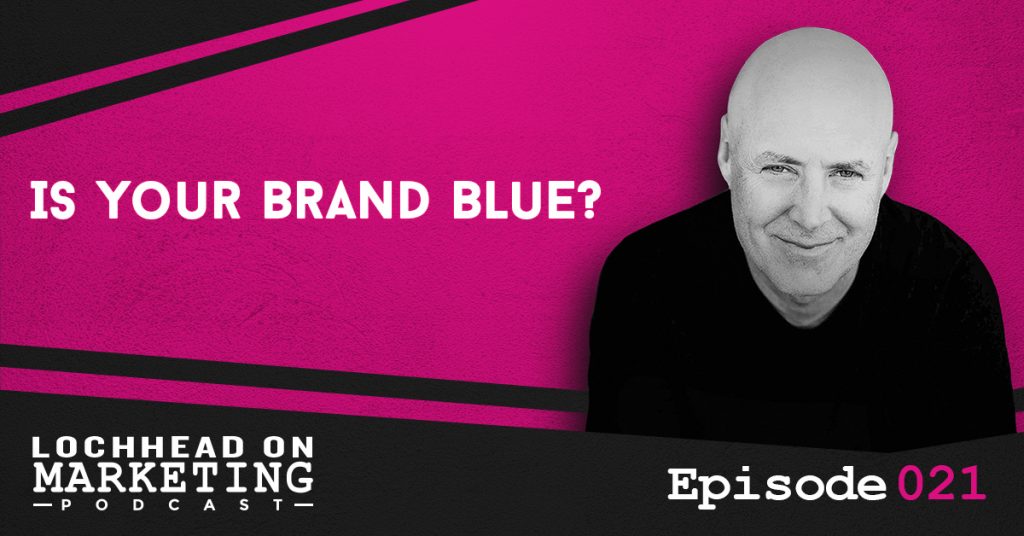
Podcast (lochheadonmarketing): Play in new window | Download (Duration: 11:05 — 10.2MB) | Embed
Subscribe: Apple Podcasts | Spotify | RSS | More
In today’s episode, Christopher Lochhead dives down deep into the power of colors and how it affects your brand marketing. In a world where almost all brands are Blue (and some are red), how do you make your brand different and stand out?
What’s With Color Blue?
Christopher recently represented a tech company with a stand-out logo, it’s color pink and orange. According to this company, 70% of B2B company logos are blue.
Christopher researched this claim and indeed found out, 33% of the world’s top brands companies are blue. Some 29% are red, 28% are black or grey and 13% are yellow or gold.
“A big part of doing legendary marketing is standing out, being different, being unique. Then for the most part, if you’re gonna be blue, you’re not going to stand out and frankly if you’re gonna be red, you’re probably not gonna stand out, too.” – Christopher Lochhead
Colors and Lack Thereof
One of the guests of Follow Your Different David Rendall, Ph.D., author of Freak Factor, is one unique example. He embraced the color pink. In fact, he wears pink shirts, pink suits and even his eyeglass frames are pink.
As a public speaker, he wears pink not only to stand out but to send a message to the world that its okay to express oneself and let go of what others might think of you. Another example is Max Temkin, the creator of Cards Against Humanity. He shared that he has no eye for color so he just went with black and white, with a distinct font.
“If you think about brands how many brands do you know that actually are strategic in their use of color?” – Christopher Lochhead
An Underexploited Opportunity
Legendary companies and legendary brands stand out because they are different. Color is an underexploited opportunity to stand out. Christopher encourages marketers and designers to think strategically about color.
“If you are involved with the re-brand or brand launch, I would encourage you to take a look at all of the brands in your near-space categories and hold it against the wall and look at what they look like [against your brand]” – Christopher Lochhead.
Christopher further asks, “how can you use color as part of your brand, as part of your logo to stand out? Ultimately, he asks what color or colors can you own? This is a great opportunity to gain a strategic advantage over the competition.
Bio:
Christopher Lochhead is a Top 25 podcaster and #1 Amazon bestselling co-author of books: Niche Down and Play Bigger.
He has been an advisor to over 50 venture-backed startups; a former three-time Silicon Valley public company CMO and an entrepreneur.
Furthermore, he has been called “one of the best minds in marketing” by The Marketing Journal, a “Human Exclamation Point” by Fast Company, a “quasar” by NBA legend Bill Walton and “off-putting to some” by The Economist.
In addition, he served as a chief marketing officer of software juggernaut Mercury Interactive. Hewlett-Packard acquired the company in 2006, for $4.5 billion.
He also co-founded the marketing consulting firm LOCHHEAD; was the founding CMO of Internet consulting firm Scient, and served as head of marketing at the CRM software firm Vantive.
Links:
Follow Your Different – Max Temkin
Follow Your Different – David Rendall
We hope you enjoyed this episode of Lochhead on Marketing™! Christopher loves hearing from his listeners. Feel free to email him, connect on Facebook, Twitter, Instagram and subscribe on iTunes! You may also subscribe to his newsletter, The Difference, for some amazing content.
019 Power of a Point of View: Play Bigger Unplugged
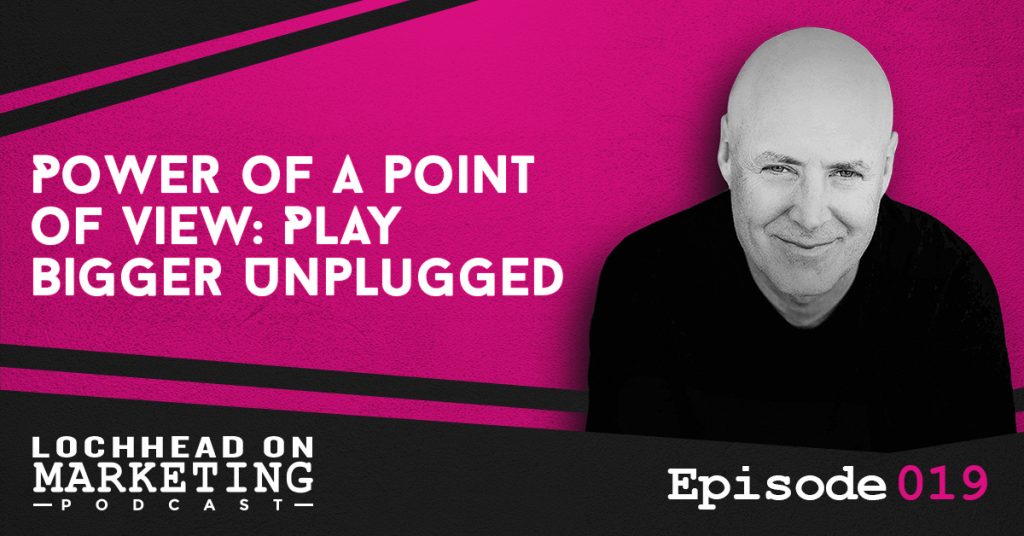
Podcast (lochheadonmarketing): Play in new window | Download (Duration: 15:27 — 14.2MB) | Embed
Subscribe: Apple Podcasts | Spotify | RSS | More
Christopher Lochhead shares an excerpt today from his first book, Play Bigger: How Pirates, Dreamers, and Innovators Create and Dominate Markets about the importance and the power of a point of view. He shares to us why legendary marketers opt to sell a POV, rather than sell a product or service.
Market the POV, not the product!
Legendary creators and designers, market the point of view or POV, not their product and services. When companies show consumers the idea or the problem that they envision to solve, consumers will most likely become interested in the products and services around that idea.
“Its counter-intuitive for most marketers, innovators and CEOs. We think what we’re doing in marketing, is marketing a product with features and maybe, benefits. When in reality, category creators and designers market the POV, because once people subscribe to your way of looking at things, they are going to be interested in what you have to market.” – Christopher Lochhead
POVs are timeless
POV is the company’s true North. It doesn’t change over time, unlike messaging. Companies such as Salesforce or American Airlines have consistently focused on their POV. These are companies who have anchored their business to a point of view, about what they stand for in the world.
Messaging is Tailored POV for an Audience
Christopher cites examples on how messages are tailored POVs for an audience, idea or a trend. He shares how they train an entire company on how to deliver their POV. Employees watch a 10-min presentation on thePOV of the company. The ultimate goal is for the employees to be able to deliver the POV.
Play Bigger Chapter 5
Here is an excerpt from Chapter 5 of the book Play Bigger:
“Stories have always been an industrial-strength force in human progress, from the epic poems of Homer to the tales of Marco Polo, Shakespeare’s historical plays, the novels of Ayn Rand, and biographies of Steve Jobs.
Stories alter perspectives and exert influence.
When traders on Wall Street consider a stock, they often ask, “What’s the story?”
When pitching a venture capitalist, entrepreneurs get funding when they craft a great story, and now a cottage industry offers pitch training.
Raw information reaches us on an intellectual level, but stories reach into our hearts and our pants.
Decades of brain research have demonstrated that stories have a more lasting impact than facts.
One 1969 Stanford study, “Narrative Stories as Mediators for Serial Learning,” showed that students remembered six to seven times more words embedded in a story compared to random words. [i]
In the 2010s, Paul Zak, a professor at Claremont Graduate University found that character-driven, attention-grabbing stories actually increase oxytocin in the brain.
Oxytocin is an empathy chemical, and it motivates cooperation and understanding—quite important when trying to convince someone to, as Apple used to say, think different.
“My experiments show that character-driven stories with emotional content result in a better understanding of the key points a speaker wishes to make and enable better recall of these points weeks later,” Zack wrote.
He added a swipe at the way too much business has been conducted for far too long:
“In terms of making an impact, [storytelling] blows the standard PowerPoint presentation to bits.”[ii]
That’s why category designers tell a story. We call that story a point of view, or POV.
After you come up with an aha of an initial market or technology insight, and after you discover and define the right category, you have to craft the story about the category that you’ll tell. You need a powerful POV.
A POV tells the world you’re a company on a mission, not a missionary company looking to make money any way it can.
It frames the new problem that your category identifies and sets you up as the answer. When someone can articulate your problem, you believe that person must have the solution.
It’s why Bill Clinton won two presidential elections by claiming, “I feel your pain,” and why Ronald Reagan beat Jimmy Carter by simply asking, “Are you better off than you were four years ago?”
Politicians are masters at this.
A great POV separates the companies, products, and categories that people love from the ones they, at best, tolerate.
When you start to think about it, you can easily see the difference between a company that has a strong POV and one that has a POV black hole.
In grocery stores, you can sense that Whole Foods has a clear POV, built around healthy gourmet products, while Safeway seems to have no POV at all other than selling groceries.
Southwest Airlines has a palpable POV; United Airlines does not.
Apple has a POV; Microsoft does not.[iii]
A POV conditions the market to accept and embrace the company’s vision and have the same aha the founders experienced.
The story leads potential customers on their from/to journey, so they understand both what is missing and why your company can fix that problem.
A POV has to shift people’s minds so they reject an old way of thinking and come to believe in something new.
It has to reach people on an emotional level.
No one remembers what you say—but they remember how you made them feel.
That feeling can be excitement about something that’s coming, or fear of missing out.
Some of the best POVs make people think: “Oh fuck, I don’t have one of those! I have to get one of those!”
To reach people’s emotions, a POV has to sound the way people talk.
It has to be simple, direct, visceral. Language matters! (check out episode Don’t Take My Word For It, inspired by Lee Hartley Carter)
Nobody in the history of the human race has ever been moved to joy or tears by a train wreck of lazy business babble.
The story about your business is more important than the facts about your business.
Sound outrageous? Maybe, but the brain research proves it’s true.
People relate to and remember stories—even people who make a living analyzing facts.
A POV tells a story with a beginning, middle, and end.
It tells the world why this category and the company creating it are different.
Different sticks.
Different forces a choice between what was and what can be.
A POV built around better is about comparing your offering to the thing customers already know.
Better reinforces the power of the category king you’re trying to beat (who by definition is not you).
If customers think two companies are tied in the better wars, they just choose the category king—or the lowest price if there’s no clear king.
A great POV takes you outside the better wars and sets you in a different space all your own.
A well-executed POV gives the company identity and culture.
It becomes the invisible hand that guides your priorities.
It results in the right kinds of employees joining the company, the right kinds of investors funding it, and the right ecosystem building out around it—and, by the way, repels those you don’t want hanging around.
Ultimately, the POV steers the company’s strategy.
A powerful POV guides every decision the leadership team makes and every initiative it pursues.
The POV helps employees intuitively feel how they should perform their jobs so they align with the company’s strategy.
Most great, enduring companies have a POV imprinted on their DNA.
To hear more about the power of a point of view and more relevant information from Christopher Lochhead, download and listen to the episode.
Bio:
Christopher Lochhead is a Top 25 podcaster and #1 Amazon bestselling co-author of books: Niche Down and Play Bigger.
He has been an advisor to over 50 venture-backed startups; a former three-time Silicon Valley public company CMO and an entrepreneur.
Furthermore, he has been called “one of the best minds in marketing” by The Marketing Journal, a “Human Exclamation Point” by Fast Company, a “quasar” by NBA legend Bill Walton and “off-putting to some” by The Economist.
In addition, he served as a chief marketing officer of software juggernaut Mercury Interactive. Hewlett-Packard acquired the company in 2006, for $4.5 billion.
He also co-founded the marketing consulting firm LOCHHEAD; was the founding CMO of Internet consulting firm Scient, and served as head of marketing at the CRM software firm Vantive.
Links:
Follow Your Different – Lee Hartley Carter
Lochhead on Marketing: Don’t Take My Word For It
Play Bigger: How Pirates, Dreamers, and Innovators Create and Dominate Markets
[ii] Paul J. Zack, “Why Your Brain Loves Good Storytelling,” Harvard Business Review, October 28, 2014,
[iii] At least it does not in the 2000s. In the 1980s and 1990s, under Bill Gates, Microsoft certainly had a POV. Roughly translated, it was: “A computer on every desk, all of them running Windows, and we’ll bulldoze the fuck out of anyone who gets in our way.” In the 2010s, under a new CEO, Microsoft is again trying to find its voice.
We hope you enjoyed this episode of Lochhead on Marketing™! Christopher loves hearing from his listeners. Feel free to email him, connect on Facebook, Twitter, Instagram and subscribe on iTunes! You may also subscribe to his newsletter, The Difference, for some amazing content.
018 Personal Branding is Bullshit
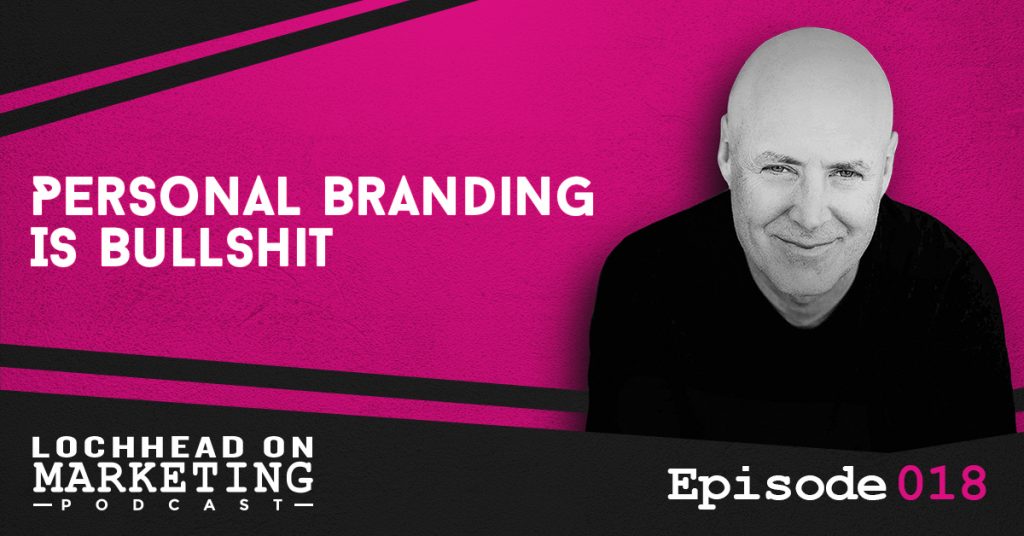
Podcast (lochheadonmarketing): Play in new window | Download (Duration: 10:03 — 9.3MB) | Embed
Subscribe: Apple Podcasts | Spotify | RSS | More
In this episode, Christopher Lochhead talks about a giant topic in business today, personal branding. He further shares the difference between a brand and a person. Moreover, he discusses why legendary executives and marketers don’t give weigh to personal branding much.
Personal Beef with Personal Branding
Personal branding has become a giant issue in business today. It seems like people cannot fire up their social media, such as Linkedin and even Amazon, without personal branding. The idea started around the late 80s or early 90s and has become effed up overtime.
Christopher lays out his argument on the difference between a brand and a person. People have a mental connection with a brand while with a person, people develop relationships.
“I have a very different relationship with my friend Sue Barsamian. She’s the most effective exec I know. Guess how much time she spent thinking about and working on her personal brand? Zero!” – Christopher Lochhead
Developing A Reputation
Sue Barsamian was the guest on Follow Your Different Episode 083. She has a solid 36-years in Silicon Valley, working with Startups and multinationals such as HP. Christopher shares that she has zero efforts in maintaining a personal brand, instead, she aims to develop a reputation.
Silicon Valley respects Sue for producing legendary results and creating massive value. Moreover, she dominated her own niche: “Legendary Enterprise Tech Executive, who scales.” In developing a reputation, Christopher poses the following questions:
“What’s your personal Niche Down? Where are you going to focus your talent? What results are you going to produce? Who are the kinds of people you want to surround yourself with?” – Christopher Lochhead
Rethink this Personal Branding Bullshit
Christopher encourages everyone to re-think this idea of personal branding because he believes that what people prefer is a reputation.
“Reputations come from producing legendary results. Personal branding, by definition, is contrived and inauthentic.” – Christopher Lochhead
People would best be deemed as a person of character, who produces results and is doing legendary work. In conclusion, Christopher advises everyone to spend zero time on personal branding and focus, instead, on the following:
1) Your personal Niche Down – what niche do you want to be known for owning
2) Producing legendary results – people who produce legendary results are highly sought after in business. They are unique by definition and they hang out with people who also do legendary things.
3) and making a difference.
“Because in my experience, people who do that, get the most valuable thing in business: a reputation.” -Christopher Lochhead
To hear more about why personal branding is bullshit and more relevant information from Christopher Lochhead, download and listen to the episode.
Bio:
Christopher Lochhead is a Top 25 podcaster and #1 Amazon bestselling co-author of books: Niche Down and Play Bigger.
He has been an advisor to over 50 venture-backed startups; a former three-time Silicon Valley public company CMO and an entrepreneur.
Furthermore, he has been called “one of the best minds in marketing” by The Marketing Journal, a “Human Exclamation Point” by Fast Company, a “quasar” by NBA legend Bill Walton and “off-putting to some” by The Economist.
In addition, he served as a chief marketing officer of software juggernaut Mercury Interactive. Hewlett-Packard acquired the company in 2006, for $4.5 billion.
He also co-founded the marketing consulting firm LOCHHEAD; was the founding CMO of Internet consulting firm Scient, and served as head of marketing at the CRM software firm Vantive.
Links:
Follow Your Different Episode 083: Sue Barsamian
We hope you enjoyed this episode of Lochhead on Marketing™! Christopher loves hearing from his listeners. Feel free to email him, connect on Facebook, Twitter, Instagram and subscribe on iTunes! Get amazing, different stories on business, marketing, and life. Subscribe to our newsletter The Difference.
106 Silicon Valley Legend Randy Komisar
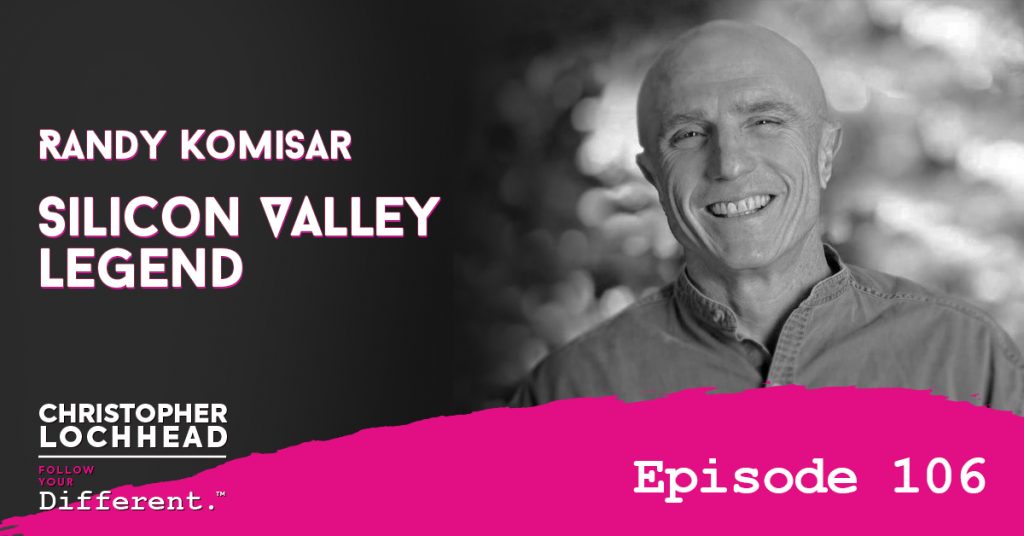
Podcast: Play in new window | Download (Duration: 1:46:38 — 97.9MB) | Embed
Subscribe: Apple Podcasts | Spotify | Pandora | RSS | More
Silicon Valley legend, Randy Komisar joins us today in a longer than usual episode, but definitely an information-packed conversation. He shares a piece of his mind to us especially on how to have a legendary career, what it’s like to be dubbed as the Digital CEO and many more.
Rare Opportunity
Randy Komisar was a partner at VC pioneer Kleiner Perkins Caufield & Byers. He worked closely with other legends like Steve Jobs and George Lucas. In fact, he has some very interesting stories he shared, being a former senior counsel at Apple and former CEO at LucasArts.
“I don’t like being disliked and I don’t particularly try to be liked. I try to be valued, to create something constructive or positive in a relationship. But being liked is not, it doesn’t cross my mind. I want to be respected, if I’m really lucky, I’d like to be admired.” – Randy Komisar
The Virtual CEO
Silicon Valley CEOs dubbed him as a Virtual CEO. Randy served in that role for companies like WebTV and Global Giving. He had some compelling stories and opinions to share in what Christopher dubbed as “the business equivalent of the lunar landing.”
He also served as the founding director of TiVo, which is a direct lineage of Netflix entering that category today. Tivo won one of the biggest patent damage claims of all time, way over billion dollars, and Randy recounts to Christopher what happened during that time.
“I actually think, we should have sued earlier. we have the patent rights to all of these, the real question was, could we have coop these guys as partners.” – Randy Komisar
Utopians Vs. Libertarians
Two significant and different technology demographics comprise Silicon Valley.
He describes the 70’s and 80’s guys as the technology Utopians. Infrastructures were allegedly oppressive at that time which led the Utopians to utilize tools and come to technology to end this. Ultimately, they wanted to empower individuals.
Furthermore, the Utopians had a sense of ‘a social contract.’ They felt they need to make the world better. These tools and the advantages that they had with these tools gave them the opportunity to challenge the status quo.
In the advent of Facebook and Paypal, we move from technology utopians to technology libertarians.
“The tools and platform that you build raise the creative endeavor. It’s not to take-the-money- and-run situation. That money gets invested in more ideas, more vision. Yes you need to make a profit, but that profit can fuel creativity or consumption, you get to choose.” – Randy Komisar
To hear more about the Silicon Valley Legend Randy Komisar, download and listen to the episode.
Bio:
Randy Komisar joined Kleiner Perkins in 2005 and focuses on early-stage investing.
He served as CFO of GO Corp. and as senior counsel for Apple Computer, following a private practice in technology law.
Randy is a founding director of TiVo and serves on the Roadtrip Nation Advisory Board and Orrick’s Women’s Leadership Board.
Additionally, he is the author of the best-selling book The Monk and the Riddle, as well as several articles on leadership and entrepreneurship.
Furthermore, he is the co-author of Straight Talk for Startups, the insider best practices for entrepreneurial success, Getting to Plan B, on managing innovation, and I F**king Love that Company, on building consumer brands.
Randy frequently speaks in the United States and abroad on such topics. Randy holds a B.A. degree in economics from Brown University and a J.D. from Harvard Law School.
Links:
Book: Straight Talk for Startups
The Monk and the Riddle: The Art of Creating a Life While Making a Living
Executives Launch Podcast To Pass On Lessons From Bill Campbell, Coach To Silicon Valley Stars
Harper Collins Speakers Bureau: Randy Komisar
We hope you enjoyed this episode of Follow Your Different™! Christopher loves hearing from his listeners. Feel free to email him, connect on Facebook, Twitter, Instagram and subscribe on iTunes!
017 Frame the Problem and Win
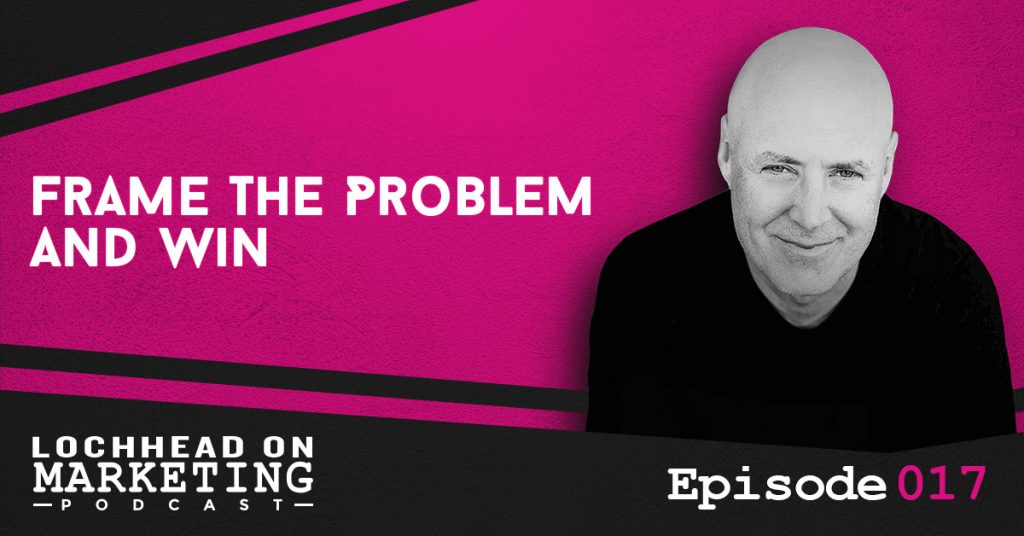
Podcast (lochheadonmarketing): Play in new window | Download (Duration: 10:52 — 10.0MB) | Embed
Subscribe: Apple Podcasts | Spotify | RSS | More
In this episode, Christopher Lochhead talks about why the company that frames and markets the problem, the most effectively, wins. To illustrate, he cites a music company, m, and ho they recently pulled something off in the marketing and PR point of view.
Frame the Problem, Not the Solution
Wise marketers and category creators have a strategic way of creating legendary marketing. One of these is framing the problem. This strategy is a sure-fire way to win a category.
“When the world agrees with you about the problem that you solved, and thinks about the problem, exactly the way you want them to, then they sort of have an ‘a-ha!’” – Christopher Lochhead.
Case In Point: Kobalt
One illustration of this point is a recent article about Kobalt. Kobalt is a music technology company, which recently raised $200 million in VC funding.
TechCrunch featured Kobalt in a two-part series. Christopher highlights a part of the article stating “changing the way the music industry does business and putting more money into musicians’ pockets in the process.”
What blew Christopher’s mind off is the title of the article: “How Kobalt is simplifying the killer complexities of the music industry.”
Why is this headline, mind-blowing?
Christopher believes that Kobalt’s PR team presented their company in a very effective way since TechCrunch featured them. The reporter Eric Peckam, needs to believe that there are “killer complexities” in the music business and that these need to be “simplified.”
“They [Kobalt] are evangelizing their problem and in this case, their getting the media to write a headline at the top of the homepage, with the exact framing of the problem that they want.” – Christopher Lochhead
As Christopher describes it, this is a legendary category design PR. Once people think that you get their problem, they connect the dots and infer that you have the solution.
“If you want to be moving your company forward, evangelize the problem. Spend a lot more time marketing, talking about the problem than the solution.” – Christopher Lochhead
To hear more about how to Frame the Problem and Win and more relevant information from Christopher Lochhead, download and listen to the episode.
Bio:
Christopher Lochhead is a Top 25 podcaster and #1 Amazon bestselling co-author of books: Niche Down and Play Bigger.
He has been an advisor to over 50 venture-backed startups; a former three-time Silicon Valley public company CMO and an entrepreneur.
Furthermore, he has been called “one of the best minds in marketing” by The Marketing Journal, a “Human Exclamation Point” by Fast Company, a “quasar” by NBA legend Bill Walton and “off-putting to some” by The Economist.
In addition, he served as a chief marketing officer of software juggernaut Mercury Interactive. Hewlett-Packard acquired the company in 2006, for $4.5 billion.
He also co-founded the marketing consulting firm LOCHHEAD; was the founding CMO of Internet consulting firm Scient, and served as head of marketing at the CRM software firm Vantive.
Links:
TechCrunch: How Kobalt is simplifying the killer complexities of the music industry
We hope you enjoyed this episode of Lochhead on Marketing™! Christopher loves hearing from his listeners. Feel free to email him, connect on Facebook, Twitter, Instagram and subscribe on iTunes!
066 Marketing Assassin Rick Bennett
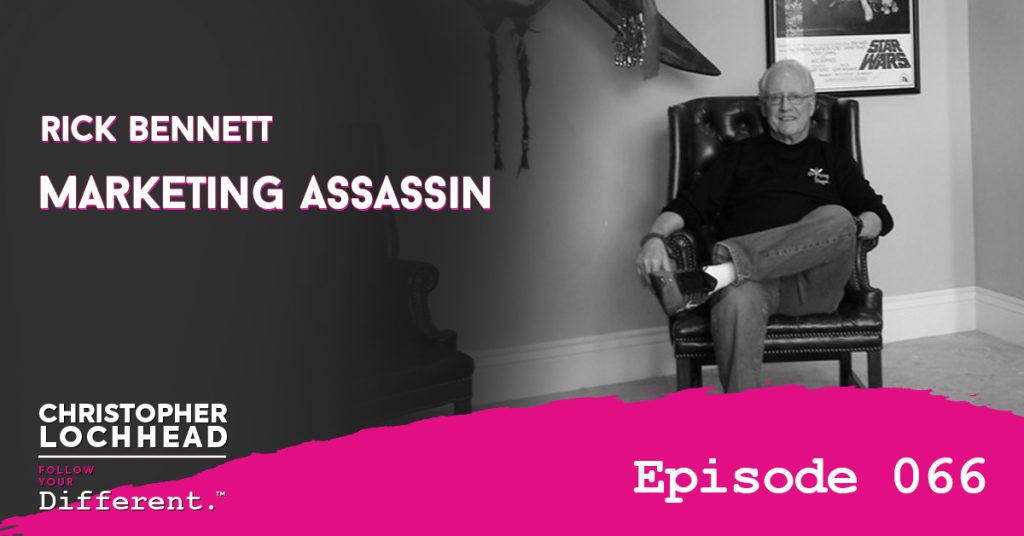
Podcast: Play in new window | Download (Duration: 1:14:34 — 68.3MB) | Embed
Subscribe: Apple Podcasts | Spotify | Pandora | RSS | More
Rick Bennett, Silicon Valley’s advertising and marketing secret weapon, joins us for the last installation of this four-part series on Marketing.
He specializes in guerrilla warfare marketing and has been the secret advertising weapon to Silicon Valley entrepreneurs for over 30 years. Two of his most spectacular successes are Oracle and Salesforce.com, working with both Larry Ellison and Marc Benioff, respectively.
“I like to do Marketing that causes emergency board meetings and CEO firings at my competitors.” – Christopher’s favorite expression from Rick Bennett
Sharing Best Practices
Having worked together in Silicon Valley, Lochhead considers Rick as one of his “Masters.” Rick is one of the advertising senseis in the field who has been humbled by the experience but is highly regarded in the industry. To Christopher’s surprise, Rick also shared how he extracts one-liners from one of his bestselling books, Niche Down: How to Be Legendary by Being Different.
Rick Bennett, dubbed as The OG (Original Gangster)—a modern-day technology Adman—has successfully implemented uniquely-crafted marketing campaigns. He stressed the importance of one-of-a-kind advertising.
“Ellison’s law states that you are not allowed to say anything that one of your competitors would say—whether in website, email, anywhere—so I insist on enforcing that to my clients too.” – Rick Bennett
Guerilla Marketing: Making Generals Surrender
Rick shared some important insights about guerilla marketing. One of the goals of guerilla warfare is to make the generals of the opposing army make mistakes.
“My ads will attack your competition like a pack of speedy, crazed wolverines” – Rick Bennett
He said, “Demoralize the generals of the opposing army, then they’ll make mistakes. You have your investors to say, ‘Hey we have a winner here’ and you have to make the employees feel that their boss is kicking ass.”
In the end, marketers should aim for a campaign where you make opposing generals psychologically surrender, even before any battle has begun.
To hear more about the interview with Guerilla Marketing Guru Rick Bennett, download and listen to the episode.
BIO:
Rick Bennett specializes in guerrilla warfare marketing.
He’s been the secret advertising weapon to Silicon Valley entrepreneurs for over 30 years.
Two of his most spectacular successes are Oracle and Salesforce.com.
Links:
We hope you enjoyed Rick Bennett on this episode of Follow Your Different™! Christopher loves hearing from his listeners. Feel free to email him, connect on Facebook, Twitter, Instagram and subscribe on iTunes!
065 The Power of Niche Networks w/ Gina Bianchini
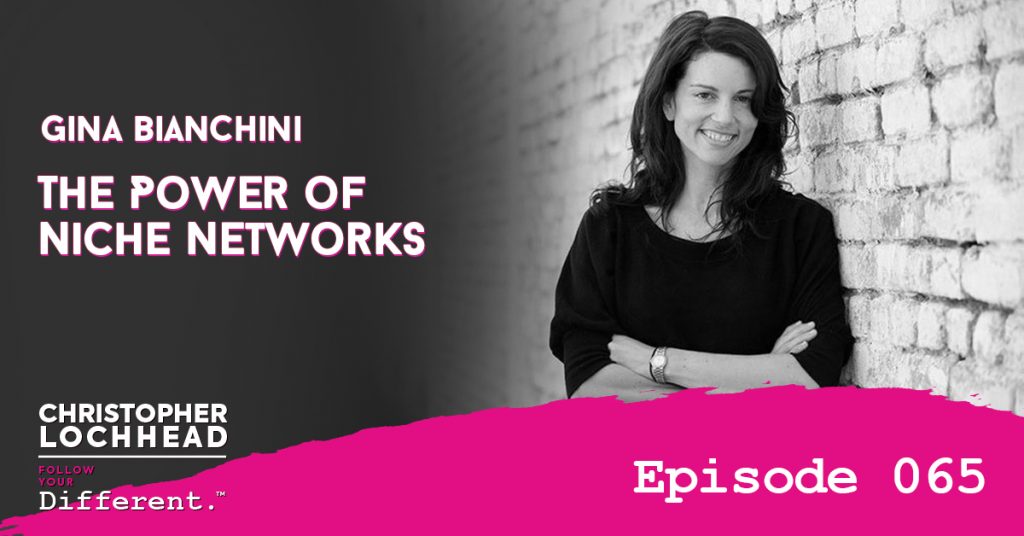
Podcast: Play in new window | Download (Duration: 1:10:10 — 64.3MB) | Embed
Subscribe: Apple Podcasts | Spotify | Pandora | RSS | More
Gina Bianchini is a pioneering entrepreneur in social networking and the founder of Mighty Networks. Today, she speaks again with her bro Lochhead. They talk about building digital communities and why the future is about creating niche networks.
“The more and more isolated that we all feel in our daily lives, the more valuable each and every one of these niche brands and businesses that can create compelling experiences.” – Gina Bianchini
Mighty Networks from a Year Ago
Mighty Networks has always been a platform for creators with a purpose. They cater to people—brands and businesses—that want to bring people together and build relationships. In turn, community members can learn and access content together while creators get paid what they are due.
All of that while helping other people become the best versions of themselves. Which is pretty cool because this is the job that everybody wants today.
On Building Niche Networks
Gina came to realize that the notion of finding one’s niche has become fundamental in social networking. That is, people are not only hungry for discovering their niches. They seek people who can put up niche networks.
“We’re all desperate for smaller, more specialized ways of building relationships, having amazing experiences and gaining expertise. The people that can put that together for us will win in a way that has just not been possible before.” – Gina Bianchini
Niche brands, businesses and creators with a purpose are creating their own worlds to help people. Gina says that the faster we all get to that world, the better off we all will be.
The Value Created by Mighty Networks
In a previous episode, Joe Pine shared with Lochhead the difference between being a company that people save time with and one that people spend time with. He says that Mighty Networks is very well on its way to becoming the latter. That is, if it isn’t already.
“Who you bring together matters as much or more to their experience with your brand and the kind of time they wanna spend with your brand as any single thing that you can do as that creator, as that brand.” – Gina Bianchini
To hear more about niche networks from Gina, download and listen to the episode.
Bio:
Gina Bianchini (Twitter: @ginab) is an entrepreneur, investor and the CEO and founder of Mighty Networks, a new type of social network platform for creating communities.
An early pioneer in social networking, she was CEO of Ning, which she co-founded with entrepreneur and venture capitalist Marc Andreessen.
Prior to Ning, Bianchini was co-founder and president of Harmonic Communications which was acquired by Dentsu.
She has also held positions at CKS Group and Goldman Sachs & Co.
She graduated from Stanford University in 1994 and has been featured on the cover of Fortune magazine, on Charlie Rose and appeared in many top business publications.
Links:
Strategy + Business – The global village needs walls
We hope you enjoyed Gina Bianchini on this episode of Follow Your Different™! Christopher loves hearing from his listeners. Feel free to email him, connect on Facebook, Twitter, Instagram and subscribe on iTunes!
064 How To Be A Legendary Marketing Leader w/ Sangram Vajre
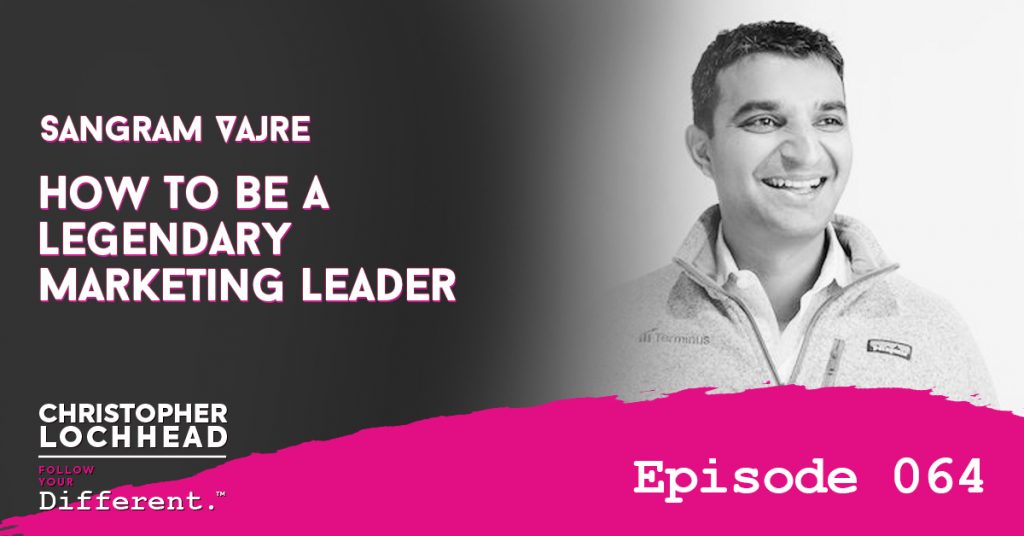
Podcast: Play in new window | Download (Duration: 1:11:32 — 65.5MB) | Embed
Subscribe: Apple Podcasts | Spotify | Pandora | RSS | More
On this episode, one of the new modern marketing leaders Sangram Vajre joins Lochhead for a riveting conversation. Sangram shares his takes on consumer and enterprise tech, category design, being an evangelist and so much more.
Boom in Enterprise
About 50 enterprise tech companies have gone public with a median increase of 126% in value since 2016. These numbers eclipse consumer tech companies, which have displayed a median of 15% market value increase. Lochhead and Sangram dish out their own conjectures about this gap between consumer and enterprise tech.
“A theory is that your job depends on it (enterprise tech). Pinterest going up and down doesn’t change, really, my job day-to-day… Zoom is a must thing right now for businesses.” – Sangram Vajre
Lochhead adds that consumer businesses are hit businesses and more vitamin-esque than aspirin-esque. Founders also tend to build consumer businesses on a short period of time due to the pressure of their predecessors’ success stories. In effect, these add to the scrambling and failure to permeate the market better.
From Poison to Accelerator
Pick-and-shovel enterprise tech is a poison that companies can run without back in the day. People knew there were pain points and yet they continued to work around them. But with the dawn of products like Zoom, everything in business has monumentally changed.
“It has gone on from being a poison to an accelerator for our business. I feel like there is something to that—the shovel is now in the house.” – Sangram Vajre
It takes a couple of years to build something that a business can run on, even at a small scale. Rather than the hype, enterprise businesses bank on this usability.
To Become an Evangelist
The Chief Evangelist of Terminus says that building a community takes humility and authenticity. It also requires really caring and having an evangelistic view of the problem.
“I will fight until the ends of the earth to fix this problem and even if it’s not fixed, I will do my contributions to fix it. And that, to me, is the definition of evangelist in a nutshell.” – Sangram Vajre
To hear more about marketing and evangelization from Sangram, download and listen to the episode.
Bio:
Sangram is the co-founder and Chief Evangelist of Terminus, a leader in account-based marketing that has raised over $20 million in funding.
Prior to co-founding Terminus, Sangram ran marketing at Pardot through the acquisition of ExactTarget. Salesforce then acquired ExactTarget for $2.5 billion dollars. He wrote the very first book on account-based marketing (ABM), published by Wiley.
Sangram is an international speaker and host of the top 50 business podcast called #FlipMyFunnel, and has been recognized as one of the top 21 B2B Influencers in the world by DMN Network and 40 under 40 by DMNews.
Sangram aims to build the largest and most engaged community of B2B professionals in the world.
Links:
Amazon – Account-Based Marketing for Dummies
We hope you enjoyed Sangram Vajre on this episode of Follow Your Different™! Christopher loves hearing from his listeners. Feel free to email him, connect on Facebook, Twitter, Instagram and subscribe on iTunes!
063 Marketing Over Coffee Playbook w/ John Wall
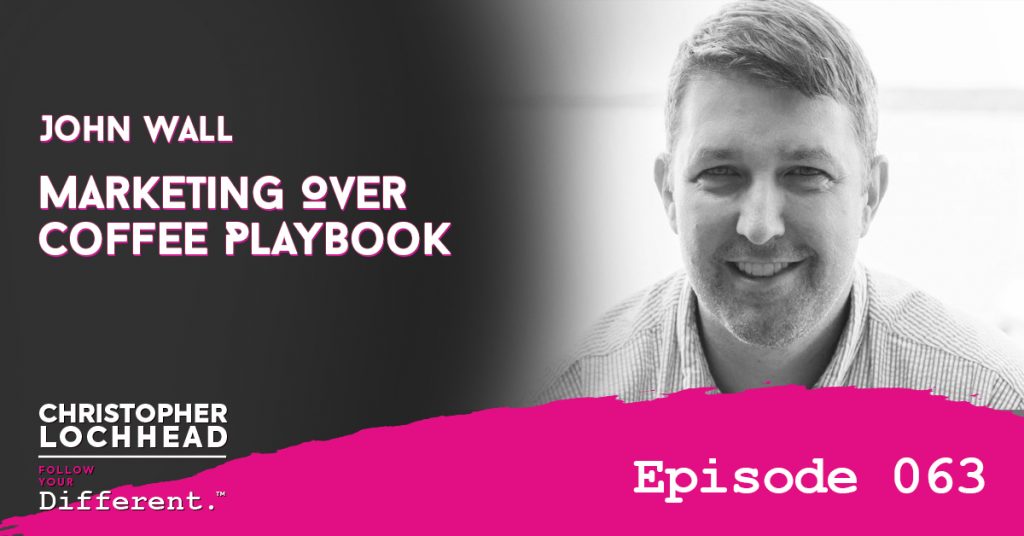
John Wall hosts the super popular Marketing Over Coffee Podcast. He joins Lochhead today in this first installment of a four-part series on legendary marketing. John shares his love of podcasting, the origins of his new book and all things marketing-related.
The Beauty of Podcasts
John believes that podcast is the easiest way to get in front of an audience who seek specific content. Everyone gets busy but they still want to learn and educate themselves. The thing is, they would rather consume media while exercising, commuting, or even while doing the lawn.
Podcasts are also very intimate, not only in the sense that listening to them means willingly letting someone speak in your ear. More often than not, the audience gets to know the hosts for who they actually are. His audience share the same love of the things that John himself is into, after all.
“Actors would be freaked out because people think that they are a character that they’re not, but with podcasting, it is really you that you’re putting out there so they do know the real you.” – John Wall
Marketing Over Coffee
John’s second book, Marketing Over Coffee Playbook, came from the desire to dig into years’ worth of podcast. He figured there was no easy way to get all the good stuff from that much content unless the audience consume all the show notes.
So he and his team set forth and got his existing content transcribed. Put into bite-sized nuggets, readers could easily go through topics they want to learn about, especially on marketing and tech.
“This book lets you take kind of a super shot of years’ worth of shows in one sitting.” – John Wall on Marketing Over Coffee Playbook
AI and Machine Learning for Marketing
Marketing can hugely benefit from artificial intelligence and machine learning, John says. Take for example machine learning for SEO. A marketer can take any SEO tool and grab a bunch of their competitor’s terms to find out how they score against them.
Machine learning makes SEO tools more powerful, too. It helps sift through and produce data on terms you rank at the top for and competitors find hard to crack into. These data can then guide content production to defend your spot in the game.
“There’s basically five areas where we see artificial intelligence and machine learning providing the most value to marketers.” – John Wall
To learn more about podcasts, marketing, AI and machine learning from John himself, download and listen to the episode.
Bio:
John speaks, writes and practices at the intersection of marketing, sales, and technology.
He is the producer of Marketing Over Coffee, a weekly audio program that discusses both new and classic Marketing with his co-host Christopher S. Penn, and has been featured on iTunes.
Links:
The Marketing Over Coffee Playbook: Now with More Wins and Wrecks!
We hope you enjoyed John Wall on this episode of Follow Your Different™! Christopher loves hearing from his listeners. Feel free to email him, connect on Facebook, Twitter, Instagram and subscribe on iTunes!

